
The Americans have now received a message loud and clear — any similar strike is, not ‘may’, going to jeopardise cooperative bilateral relations. It must be assumed that this will include intelligence sharing. Two senior American officials, US Special Representative for Afghanistan and Pakistan Richard Olson and Senior Adviser and Director for South Asian Affairs at the National Security Council Dr Peter Lavoy, received the message from the Prime Minister’s Adviser on Foreign Affairs, Sartaj Aziz, and the Army Chief, General Raheel Sharif. Messengers do not come much weightier than that.
The Chinese have weighed in with support for our position on drones as well as our future membership of the Nuclear Suppliers Group (NSG); which is yet another foreign policy matter that suffers from the absence of a foreign minister to have an overall responsibility for a range of current and overlapping issues. Discussions were said to be “candid and tense”, which is Diplo-speak for something close to a blazing row, with the Pakistan team requesting the Americans target the Taliban safe havens in Afghanistan — something they have hitherto largely avoided. Pakistan-US relations have always been transactional and always tempered by whatever the US has on its to-do list no matter we like it or not. America continues to operate a doctrine of unilateral exceptionalism and expects the rest of the world to be at least complicit with that. Pakistan now finds itself between the proverbial rock and a hard place — damned if we do and damned if we don’t. Arresting the slide in relations is not going to be easy, and another incident such as that which killed Mullah Mansoor could be mortal to more than the intended target.
The Mansoor incident, apart from prompting a slide in relations, appears to also be prompting a reassessment of bilateral relations with the US more generally. The warming of relations was only ever skin deep, and with Washington strengthening its ties with India on the defence and civil nuclear power fronts, and seen beside the successful visit of Indian Prime Minister Narendra Modi in the last week, there is a danger of Pakistan being pushed yet again to the sidelines in terms of regional geopolitics. Sartaj Aziz is not far from the mark when he says that the US “abandons us when it doesn’t need our help” — symptomatic of the transactional relationship referenced above and a symptom of a malaise that has persisted for 60 years.
As far as membership of the NSG is concerned, Pakistan seems to have woken up to the implications of India joining the group a little late, and there is now some shuttling around to gain support for our cause. The Americans appear prepared to craft a kind of collusive exceptionalism with India, whilst at the same time it is pressuring Pakistan not to seek individual states’ support for its application. China has pointedly ignored the US in this respect, possibly signalling that it is uneasy about developing ties between India and the US.
Pakistan remains a state of crucial relevance to the region, not least in terms of how events play out in Afghanistan in the next year. Despite assertions to the opposite by Mr Aziz, Pakistan needs a dedicated foreign minister — if for no other reason than to pull together a very unhappy and leaderless Foreign Office and bring some proactivity and clarity to foreign relations. Dropping off the edge? Possibly, and with no obvious parachute to hand.
Published in The Express Tribune, June 12th, 2016.
Like Opinion & Editorial on Facebook, follow @ETOpEd on Twitter to receive all updates on all our daily pieces.
1732503274-0/Untitled-design-(43)1732503274-0-405x300.webp)
1732501636-0/Untitled-design-(42)1732501636-0-165x106.webp)

1732498967-0/Outer-Banks--(1)1732498967-0-165x106.webp)
1732086766-0/BeFunky-collage-(74)1732086766-0-165x106.webp)







COMMENTS (6)
Comments are moderated and generally will be posted if they are on-topic and not abusive.
For more information, please see our Comments FAQ